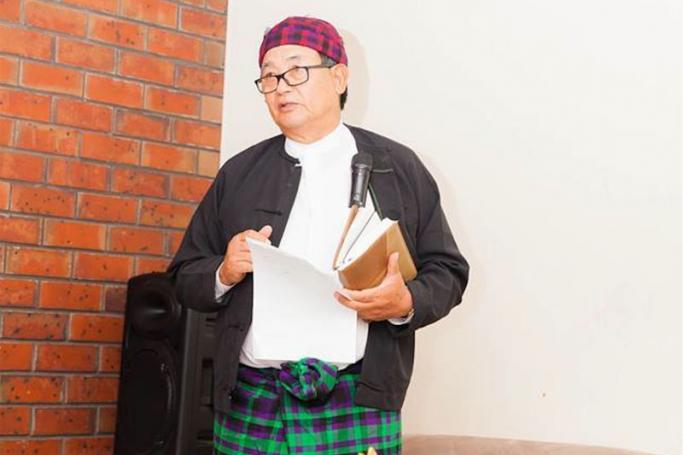In recent months, Pat Jasan, an ethnic Kachin public movement, has made headlines with its vigilante-style march on opium producing poppy plantations, which its volunteers cut down in an effort to curb rising drug abuse in northern Myanmar’s Kachin State.
Thousands of volunteers were involved, many of them motivated by their leaders who belong to the Kachin Baptist Church, which first set up Pat Ja-san in 2014.
Despite the presence of a police escort, Pat Jasan’s march into a poppy-growing area controlled by a government-backed militia ended in a violent confrontation with poppy farmers and militia members in late February. About 30 Pat Jasan volunteers were injured.
The movement’s methods, in particular its forced detention of addicts, have been called into question.
Rev. GyungHkawng, 65, Kachin Baptist Convention chairman, spoke to Myanmar Now about the movement’s origins and objectives, and why it is employing a vigilante approach.
Question: What are the reasons that Pat Ja San was set up?
Answer: Drug abuse cases and arrests are increasing among the Kachin people. The users end up having a divorce from their wives and loss of livelihoods. Many Kachin people are addicted to drugs. As the government could not effectively conduct an anti-narcotics campaign, we did it with the help of local people in order to wipe out all parts of the opium industry. We first formed a 13-member committee comprising leaders of the Kachin community.
Q: How many poppy fields have been destroyed since the group was first established in 2014?
A: We destroyed over 9,000 acres of poppy fields in 2014 and 2015. We have not compiled the figure for this year, but it could be some 1,000 acres. We destroyed mostly poppy fields in Tanai and Putao townships in this state.
We conducted educative talks on the dangers of poppy. We held discussions with community leaders at Kampaitee (a border town in the militia-controlled area) last year and they promised us they would destroy poppy fields. So then we tried to eradicate the poppy fields there.
Q: What will you do against the poppy fields in areas under control of the Kachin Independence Army?
A: The KIA is destroying the poppy fields by itself there, so we need not go. We only conducted eradication in Kachin people’s areas where the KIA has no access. And we do not destroy poppy fields in other ethnic areas.
Q: Why don’t you register Pat Ja San as an official organisation?
A: The government did not accept our registration, saying poppy eradication is their task and that they will take action against our movement. How-ever, we cannot neglect immoral practices by the followers of our church. Authorities banned our anti-poppy movement, but we have to take the risk (of government action) as we cannot stop to protect our people.
Q: Does Pat Ja San inspect private houses?
A: Yes, we inspected the houses of our followers and Kachin people if we get tip-offs on who is selling heroin. We did not harass people, but we search for illegal drugs.
Q: Accusations have been circulating that KIA members are taking part in Pat Jasan’s operations. What is your response to this claim?
A: The KIA is conducting their own anti-drug policy separately. This is wrong information. We are working with only ordinary people. Our movement sends a message about poppy cultivation to the global community. We are trying to reveal this situation in Myanmar and collect data. We want to announce who are the drug lords in our country.
Q: How long will it take to eradicate all poppy fields across Kachin State?
A: We will continue our movement on poppy eradication regardless of time limitations. Our mission will be finalised within one or two years if the government supports us, otherwise we cannot estimate how long our movement will need to work.
You are viewing the old site.
Please update your bookmark to https://eng.mizzima.com.
Mizzima Weekly Magazine Issue...
14 December 2023
New UK Burma sanctions welcome...
13 December 2023
Spring Revolution Daily News f...
13 December 2023
Spring Revolution Daily News f...
12 December 2023
Spring Revolution Daily News f...
11 December 2023
Spring Revolution Daily News f...
08 December 2023
Spring Revolution Daily News f...
07 December 2023
Diaspora journalists increasin...
07 December 2023
Naungcho to be transformed into tourist destination












